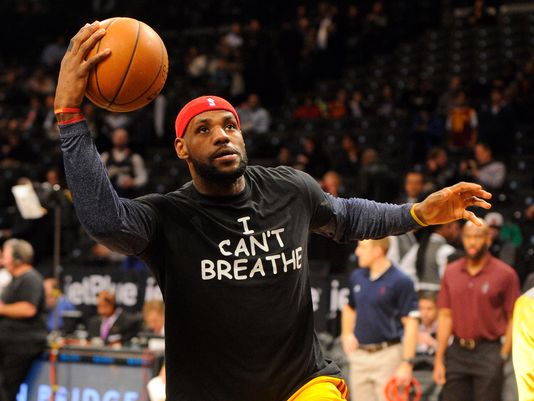Professional athletes have created a stir in recent weeks by expressing sympathy for unarmed victims of police killings, such as Michael Brown, Eric Garner, and 12-year-old Tamir Rice. Five St. Louis Rams players entered the football arena Sunday with their hands held high, a sign of solidarity with those protesters who have been crying out, “Hands up, don’t shoot.” The tee-shirt worn last night by LeBron James was particularly poignant: “I can’t breathe” were the last words uttered by Garner before dying from a police chokehold.
I think black athletes are stepping out of their normal apolitical stances (recall Michael Jordan and Tiger Wood) because they so strongly identify with those African Americans who are metaphorically finding it difficult to breathe freely in today’s America. The suffocation image speaks to them, I think, because it captures how they feel dogged by certain realities that don’t affect white Americans. These include skewed arrest rates for black youths, racial profiling, and the many signals that get sent out that their lives are worth less than other people’s. In today’s post, I share a passage from a Toni Morrison novel on what it feels like to breathe freely, without worry.
First, however, I share how I came to realize that different people can experience the same landscape in radically different ways. Until I got married, I had no idea that stairwells, parking garages, and parks at night were other than what I thought they were. Call it the myopia of male privilege. My youngest son, who has married a woman from Trinidad and has two young daughters of color, is going through his own awakening.
Milkman in Song of Solomon is engaged in a roots quest that has alienated him from a former friend, who is out to kill him. I won’t write anything today about the deadly clash in the book between black moderates and black extremists as it doesn’t relate to recent news. At the moment I am interested in how resignation in the face of suffocation can turn to hope.
The two men are in a forest and Guitar is garroting Milkman with piano wire. Milkman first feels a wash of sadness and surrenders to his fate but then gets a second chance at life:
The wire pressed into his neck then and took his throat. It cut like a razor into his fingers, tore into the skin so deeply he had to let go. The wire pressed into his neck and took his breath. He thought he heard himself gurgling and saw a burst of many-colored lights dancing before his eyes. When the music followed the colored lights, he knew he had drawn the last sweet air left for him in the world. Exactly the way he’d heard it would be, his life flashed before him, but it consisted of only one image: Hagar [his former girl friend] bending over him in perfect love, in the most intimate sexual gesture imaginable. In the midst of that picture he heard the voice of the someone holding the wire say, “Your Day has come,” and it filled him with such a sadness to be dying, leaving this world at the fingertips of his friend, that he relaxed and in the instant it took to surrender to the overwhelming melancholy he felt the cords of his struggling neck muscles relax too and there was a piece of a second in which the wire left him room enough to gasp, to take another breath. But it was a living breath this time, not a dying one. Hagar, the lights, the music, disappeared, and Milkman grabbed the Winchster at his side, cocked it, and pulled the trigger, shooting into the trees in front of him. The blast startled Guitar, and the wire slipped again.
Milkman’s exhilaration and new sense of empowerment after escaping reminds me of what the protesters are feeling. By naming and confronting those realities that have circumscribed their lives, they are able to walk tall and free. Here’s Milkman:
[H]e found himself exhilarated by simply walking the earth. Walking it like he belonged on it, like his legs were stalks, tree trunks, a part of his body that extended down down down into the rock and soil, and were comfortable there—in the earth and on the place where he walked. And he did not limp.
Few things are more powerful than this sense of belonging. We all deserve it.


